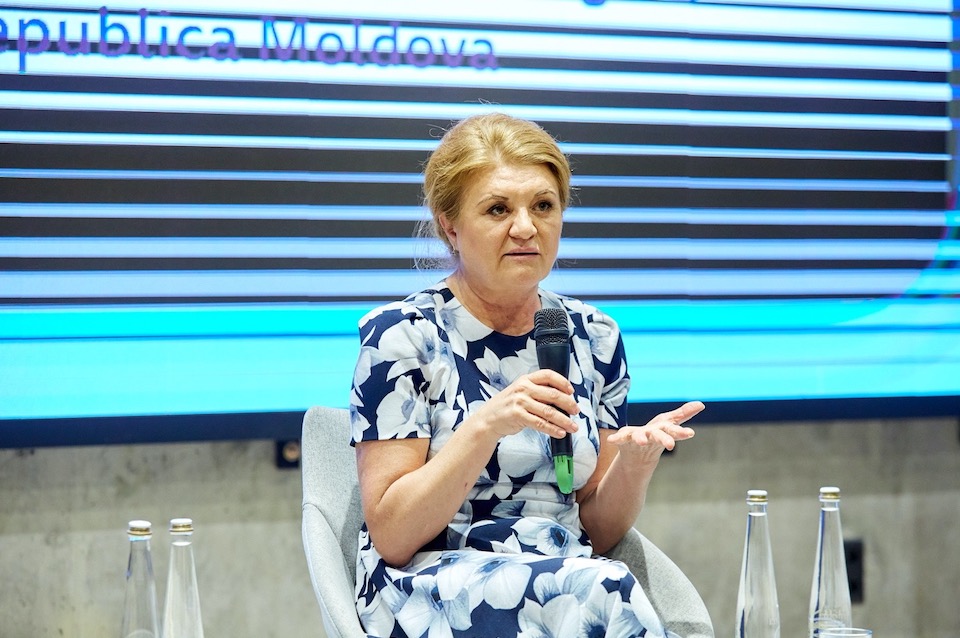Interview: "The biggest challenge for me was understanding the dimension of peace from the perspective of the risk of war"
Date:
Originally posted on UN Women Moldova’s website.

Jana Costachi is the State Secretary of the Ministry of Internal Affairs of Moldova. In the past, she has served as a public official and heading non-governmental organisations (NGOs) and networks focused on social policies, migration regulation, promotion of equal opportunities. Since the beginning of the war in Ukraine, she has been actively involved in managing the flow of refugees into Moldova and providing a prompt response to their needs. On the International Day of Peace, we spoke to Ms. Costachi about her experience supporting refugees and peacekeeping processes.
We know from experience that women's participation makes crisis response and recovery more effective, inclusive and sustainable. How can we encourage and increase the involvement of women in decision-making processes, peacekeeping, diplomacy and humanitarian efforts?
We can encourage women by setting our own example, by maintaining a dialogue and creating bridges of communication between the women who have the capacity to make decisions and the beneficiaries who are impacted by their decision.
Looking back, what are the biggest challenges you've faced and what achievements are you most proud of?
The biggest challenge for me was understanding the dimension of peace from the perspective of the risk of war. We had to learn things that we didn't know on the go. And the biggest challenge in a crisis situation is that it critically, almost inhumanely, shortens the time you have to make a decision.
Similarly, we had to adjust everything we were implementing in a matter of hours, depending on the situation we were seeing at the moment, both at the border and in the territory of Moldova.
From an institutional point of view, the biggest challenge was dealing with a flow of people that we never imagined could be so big.
Of course, there are also many things that I am proud of. First of all, the team we worked with and our ability to adjust, being a ministry of force. I am proud of my colleagues’ abilities to think very creatively and come up with seemingly simple but essential solutions. For example, I entered the Crisis Center in Palanca on the second day of the war and during that hour I was there, all the refugees were constantly asking for my phone so that they could send messages to their families who remained in Ukraine. We acted immediately and, together with the director of the Crisis Center, got in touch with a mobile operator to install a Wi-Fi network by that same evening.
Many women have been involved in helping and supporting refugees. What is the added value that women from law enforcement bodies have?
It turns out that any crisis or disaster that immediately affects people's quality of life requires a response that policewomen handle just as well as men—or perhaps even better. Why? Because usually the people who suffer the most are women and children. And a woman can understand their immediate feelings and needs much better. It is a natural pattern, not only from the perspective of gender equality theories but also from the perspective of identifying human needs with greater precision during times of crisis.
The majority of refugees are women and children. Based on your experience of interaction with them, how do they feel in Moldova?
In the context of the refugee crisis, the Ministry of Internal Affairs had the responsibility to ensure the continuous flow of refugees, women and children into Moldova as well as their access to the territory. This meant thinking about very short-term solutions, such as providing blankets at night when it was snowing outside, or hot tea, which our police officers brought from the Palanca Center until the international organisations started to arrive. It also meant creating children's game rooms at the border crossing point or giving mothers access to hygienic packages and diapers for their children. We have been able to secure so many human things at the border.
I also appreciated and encouraged the way the community mobilised and became part of the process. As a result, we were able to actively facilitate access for hundreds of cars to pick up families with children from border crossings.
What is be needed to strengthen the response to the refugee crisis and make it more inclusive, and how can we help promote resilience and sustainable peace?
My conviction is that in Moldova, refugees from Ukraine must be encouraged not to feel on the margins of society. Our task is to think of short-term, immediate assistance packages as well as opportunities for social integration through which refugees can learn the language, culture and apply their skills in practice.
In order to promote peace, it is absolutely necessary to immediately condemn, unequivocally and without any restraint, the aggression that is gaining increasing dimensions, as the situation at the border of our country has shown. I believe we must signal that we do not tolerate, accept or consider any manifestation of violence as normal conduct.